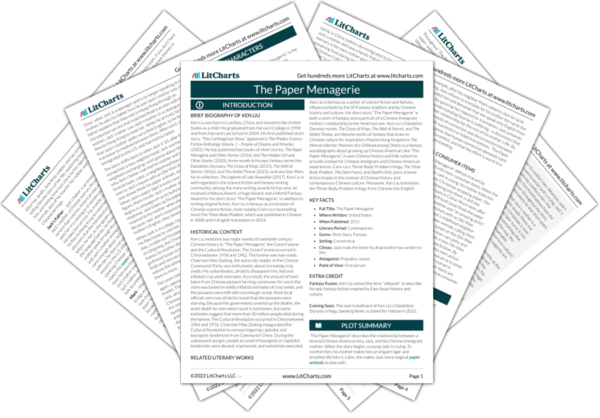In “The Paper Menagerie,” acts of translation represent the desire for human connection and the attempt to understand other people. Early in the story, Jack asks his American father how he came to marry his Chinese mother. and Jack’s father explains that he met Jack’s mother through an introduction service. Initially, he believed that she spoke English because the introduction service told him so and wrote English letters to him on her behalf. When he flew to meet her in Hong Kong, however, he learned that she spoke almost no English. Rather than becoming angry, he hired a translator. This choice to translate and seek connection despite the language barrier, rather than give up on a possible relationship, eventually leads to Jack’s father and mother marrying and having Jack. Similarly, when Jack finds a letter from his mother after her death, he immediately searches for a Chinese tourist to read it aloud, translating the letter from written to spoken Chinese. The speed with which Jack searches for a translator indicates his desire to connect with and understand his mother after her death.
By contrast, when characters in “The Paper Menagerie” refuse to translate, they are refusing connection and understanding. For example, after his neighbor Mark subjects Jack to racist bullying, Jack refuses to translate for his mother the racist slur Mark called him and demands that she speak only English from then on. By ignoring her request for translation, Jack prevents her from understanding how he is suffering—a disconnect that damages their relationship for the rest of his mother’s life. By marking moments of connection and disconnection between characters with successful or failed translations, “The Paper Menagerie” suggests that human connection demands hard work and even discomfort, and that the effort is worth it in order to build understanding.
Language and Translation ThemeTracker

Language and Translation Quotes in The Paper Menagerie
“English,” I said. “Speak English.”
She tried. “What happen?”
I pushed the chopsticks and the bowl before me away: stir-fried green peppers with five-spice beef. “We should eat American food.”
Dad tried to reason. “A lot of families cook Chinese sometimes.”
“We are not other families.” I looked at him. Other families don’t have moms who don’t belong.
He looked away. And then he put a hand on Mom’s shoulder. “I’ll get you a cookbook.”

Unlock explanations and citation info for this and every other The Paper Menagerie quote.
Plus so much more...
Get LitCharts A+I took the letter with me downtown, where I knew the Chinese tour buses stopped. I stopped every tourist, asking, “Nin hui du zhongwen ma?” Can you read Chinese? I hadn’t spoken Chinese in so long that I wasn’t sure if they understood.
The young woman handed the paper back to me. I could not bear to look into her face.
Without looking up, I asked for her help in tracing out the character for ai on the paper below Mom’s letter. I wrote the character again and again on the paper, intertwining my pen strokes with her words.
The young woman reached out and put a hand on my shoulder. Then she got up and left, leaving me alone with my mother.
Following the creases, I refolded the paper back into Laohu. I cradled him in the crook of my arm, and as he purred, we began the walk home.











